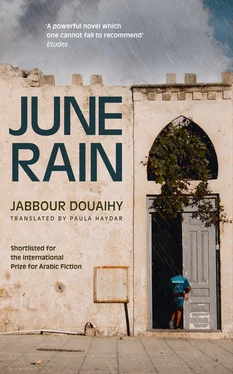Eliyya had been away from the house for hours. On his return he discovered that Kamileh had taken advantage of his absence to put everything back where it belonged. It was as if the whole time he was at home she was recording his every move and every mess he made, and as soon as he picked up his bag and went down the few steps between the house and the main road, she went about shutting every window he had opened, opening every door between the rooms he had closed, and putting away all the china teacups, the ones with the Romeo and Juliet design, that he had taken out and put on the table. She reopened the curtain half way. Early on, Eliyya had chosen to sit in the same chair every day from which he had a view of the mountains and the clouds high on the horizon. But there was a gloomy building that ruined the view to the left, so he always slid the curtain over a little when he sat there in order to limit his view to the natural scene. Every day when he came home and sat down, he would look out the window and see that building with its dreadful faded colours blocking the view all over again. Then he would realise that his mother had pulled the curtain back to its original place. It was the same with the picture that he took down to get a better look at, the one of him dressed in a Maronite Patriarch’s habit on Palm Sunday which had been taken as he was being carried on people’s shoulders, his eyes brimming with tears. She always put the picture back up on the wall, even if it took a long time and exhausted her with all the standing and straining to feel for the nail to hang the picture on. Kamileh knew her house by heart. She couldn’t rest unless she was sure everything was as it should be, not a single thing out of place, exactly as it had been throughout all those years of living alone. If Eliyya came home in the evening and shut the front door without locking it, she could not sleep a wink. She would wait until he went to his bedroom, then she would get up, walk slowly to the door, and turn the key two full turns plus once extra until she could hear the click of metal against metal. Only then could she sleep.
As soon as he had arrived from America, whenever Kamileh wasn’t paying attention, Eliyya went around opening dresser drawers, ones that squeaked from lack of use. He opened the wardrobe to find only her clothes, and his from before he left. Although the walls were covered with pictures, there wasn’t a single one of his father. No shoes, no ties. He searched everywhere for his father but found only traces of himself. His mother never threw a single thing of his away. Two school uniforms, books, toys… and the accordion. She was quite proud of her collection. His first rocking cradle, which she turned into a planter for flowers and plants, his report cards, his diplomas and the shiny metal bird standing on one leg that he won in the French poetry competition.
Outside the town, heading where his mischievous friends used to take him, he wrote in his journal: I walk along a red dirt road that ripples through the ancient olive trees with their twisted and tangled branches that sometimes appear to be praying and other times rebelling. A moment ago, a man riding a donkey passed me. He was making special sounds to spur the donkey on or make him slow down, but I wasn’t able to get my camera out before he disappeared around a corner, so I couldn’t get a picture of him. An old woman wrapped from head to toe in tattered clothes was collecting dry branches, perhaps to start a fire. Or maybe she was one of those poor gleaners who comb through the olive groves for stray olives left under the trees after harvest. Around here they have a saying that the son of the king would get down off his horse to pick up a stray olive. That was in the past. Today olive oil is cheap and the competition is as fierce as ever, and more and more doctors advise people to stay away from the local oil because of its high acidity. An endless herd of goats passes by, led by a shepherd who can’t be more than fourteen years old. He is waving his broad staff as he makes his way up towards the nearby mountains. The sound of a bell around a billy goat’s neck can be heard. It’s the time of year when the flocks migrate up into the high mountains. It feels ancient and shallow at the same time. As if things pile up here in time but not in place. The place is the same as it was at the beginning of time. It doesn’t bear the stigma of the passing of years. In the background are high mountains spotted with remnants of snow gleaming in the spring sun. This land truly reminds one of the New Testament, as if just around the bend is Peter denying his master Jesus Christ, right there at the entrance to the Mount of Olives.
That evening, he asked his mother, ‘Was Elias al-Semaani telling the truth?’
She blew up at him. ‘You’re listening to that coward? He ran away. He left his friends and his cousins and he was so scared that he ran off the road down into the rugged terrain. They lost track of him. They thought he was killed. I wish he had been killed. He’s a burden to his family. But he reappeared two days later totally humbled. He started telling tall tales about himself and those he abandoned in the middle of the whole mess.’
She got all wound up and then suddenly calmed down and got back to the heart of the matter. ‘Your father was killed forty-three years ago. What more do you want?’
He smiled.
He’d been smothering his mother with smiles ever since his arrival.
The voice came from outside the front door.
A stern voice.
My mother was a stranger. She taught us many things and still does so today.
She taught us, for example, to shake hands with our elders rather than let them grab our shoulders or lovingly touch our faces; she taught us not to offer our cheeks to be kissed by anyone.
She taught us to turn off the lights when we left a room and to shut the door behind us whenever we entered the house. She was the only one in the neighbourhood who locked the door.
‘This is a house,’ she used to say.
My father was inside shaving, enjoying every movement, taking his time, going after the little hairs inside his nose without touching his moustache. He was good at everything he did.
My father didn’t hear the man calling at the door.
It was Sunday, roughly the middle of June. Every day of the week had its agenda in my mother’s calculations and plans for our upbringing. We were waiting for my father, all bathed, dressed, and ready to go, having already worked out the seating arrangement for the back of the blue Chevrolet.
That’s how Sundays were in the spring. As we waited, we imagined how he would drive the car, tilting his head to the left and whistling around the difficult bends. Whenever he whistled, we would laugh secretly and wink at each other, my sister and I. On Sundays we would visit the Grotto of Qadisha. We would touch the stalactites that hung down like icicles from the cave’s ceiling. We would yell to each other and wait for the echoes to reverberate from its deep recesses. We would have lunch at the restaurant and my father would order a glass of arak along with the food. Once we came back with a picture frame made of cedar wood in which we put a picture of the four of us standing in a line, from tallest to shortest. The two daughters first and after us, a boy and then another boy, to make sure that the first boy wasn’t left by himself, as my father would say.
The man called again, louder this time. We heard him calling out without knocking on the door.
Strange. I remember how visitors often used to call from outside rather than knocking on the door if the door was shut, perhaps to object to our door always being shut.
My mother was standing in front of the mirror putting the last touches of red on her lips and examining the skin under her beautiful eyes. My mother used to worry a lot about wrinkles. She looked at us, her index finger pressed against her pursed lips to warn us not to respond or make a sound. Perhaps the man calling from outside would leave.
Читать дальше












